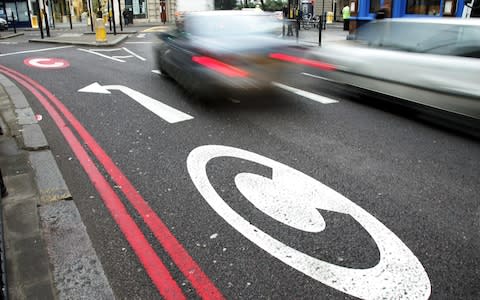Sadiq Khan's T-charge is an unfair tax on London's poorest motorists

London is a dirty city. It chokes on the fumes of tens of thousands of buses and taxis, nearly all diesel, idling on clogged streets. It heaves under the daily strain of the morning commute, with its many millions of unnecessary journeys, and it bristles with cranes and diggers adding yet more concrete, yet more smog and yet more people to an unsustainably polluted place.
Mayor Sadiq Khan has vowed to find a solution to this deadly mess, so it’s a shame that the new T-charge – a £10 penalty for having an older car – so spectacularly misses the most obvious targets.
“The vast majority of pre-2006 vehicles will get [the] additional charge,” boasted the press release when it was announced. “The toughest emission standard of any world city”.
But it’s not pre-2006 vehicles that get the charge, is it Sadiq? It’s their owners. People for whom a daily £10 penalty is going to cause significant financial pain, another needless expense adding pressure to already-strained household finances.
Because let’s be honest, the driver behind you at the traffic lights in her Y-reg Clio is unlikely to be the most affluent person on four wheels. A 52-plate Astra van with a ladder on its roof isn’t on its way to the Ritz for tea. London is already an expensive place, and our mayor wants the city’s poorest motorists to pay an extra tenner every day. Add that to the congestion charge and the total cost is £21.50 – three hours' work at minimum wage.
Sadiq Khan knows that if you’re taking a pre-06 car into central London, you’re probably not doing so for fun, and have already explored the options available to you. He knows that of the estimated 10,000 cars subject to the £10 fee, most will just have to chalk it up as another penalty for being poor in London. This is the Sadiq who grew up sharing a room in a crowded council flat – I wonder if the mayor, now on £143,911 a year, ever wonders what effect his new £10 sanction would have had on the household that raised him.

So what can you do if you’re one of the thousands of people who need to drive into town, but who can’t afford a new car? There are plans for a diesel scrappage scheme, in which people with a bit of spare cash can trade in their older oil-burner in exchange for money off a brand new, greener car. The current figure being thrown around is £3,000, a nice discount to those who can afford it, but nowhere near enough to enable most people to buy a £30,000 car.
Aside from the fact that the scrappage scheme will disproportionately favour the rich – just like the T-charge – it’s also an ecological mistake. The car-making industry is obviously in favour of a scheme that will help them sell more new cars, but unnecessarily scrapping a serviceable product and building a whole new one in its place is a short-sighted, wasteful idea. Just like Labour’s policy that pressured people into buying diesel cars in the first place, this diesel scrappage scheme 15 years later feebly tries to solve one problem by causing another.
For everyone who can’t afford a new car, or to stop driving in London, there’s no real alternative. It’s another tenner on top of the mountain of expenditure that makes the city such a harsh place to live. The cruelty of this scheme and the pride with which it’s been announced are both distinctly unpleasant, albeit arguably indicative of how this city treats its lowest-paid workers. But it’s the wilful misdirection of blame that makes it so unpalatable. While tens of thousands of fossil-fuelled buses, vans and taxis still constitute the backbone of London’s infrastructure, it’s wrong to pick on the poorest private households. I'll be surprised if this regressive tax has any noticeable effect on air quality, but it will certainly have a colossal impact on London’s least affluent motorists.
For all the latest news, advice and reviews from Telegraph Cars, sign up to our weekly newsletter by entering your email here

 Yahoo News
Yahoo News 
